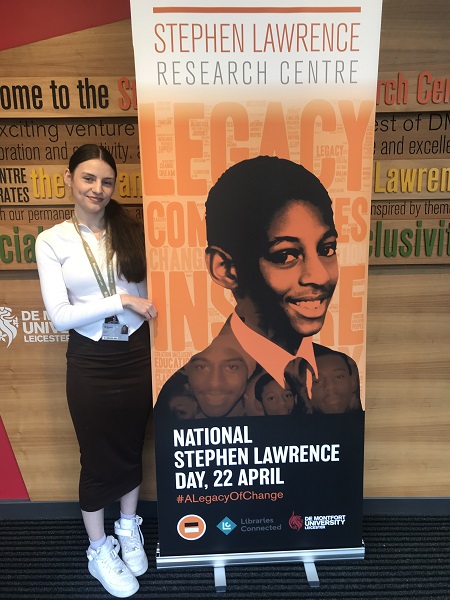A student who chose to come to De Montfort University Leicester because of its work to preserve the legacy of murdered teenager Stephen Lawrence, has designed a poster which will be used around the UK to promote his national day of remembrance.
The annual Stephen Lawrence Day takes place this Friday (April 22) and commemorates the life and legacy of the 18-year-old who was murdered by racists in South London in an unprovoked attack in 1993.

Keeley Close, from Birmingham, decided to study Law, Human Rights and Social Justice at DMU after reading about the work of the Stephen Lawrence Research Centre (SLRC), which was opened on campus in 2019.
It houses the Stephen Lawrence exhibition and is home to academics whose internationally-recognised research drives forward conversations that are shaping and influencing how we think about race and social justice.
Keeley took up an internship at the centre via the university’s Frontrunners scheme and is currently on a year-long paid placement as part of her sandwich course. She decided to use her knowledge of Stephen’s story to design the branding for April 22.
Stephen’s mother Baroness Doreen Lawrence approved the design and it will now be used to promote Stephen Lawrence Day events happening around the UK.
21-year-old Keeley said: “I feel like it really hasn’t sunk in that my design is being used. I am being quite laid back about it then every so often someone says ‘Oh my God, you did that?’
“It is incredible to think it will be on display in libraries and public spaces around the UK.
“The starting point was orange as it is Stephen’s favourite colour. Then surrounding the image are key words – such as legacy, justice, research – which I associate with Stephen’s story and reflect the objectives of the Stephen Lawrence Research Centre.
“I wanted the words to jump out at people and make a connection straight away with what Stephen Lawrence Day is all about.”
It took Stephen’s mother Baroness Lawrence – the former Chancellor of DMU – and lawyer Imran Khan QC, 18 years to get a conviction against two of Stephen’s murderers.
A subsequent independent inquiry by former High Court judge Sir William Macpherson concluded the police investigation into the killing had been “marred by a combination of professional incompetence, institutional racism and a failure of leadership”.
Like most 18-year-olds, Stephen had a passion for sport, particularly athletics, loved art and dreamed of a successful career, which in his case, was as an architect.
Since then Baroness Lawrence has used Stephen’s legacy to encourage young people to be inspired about what they can achieve in their own lives, create the kind of community they want to live in and have a strong voice in building a fairer and more inclusive society.
Part of that legacy exists through the creation of the SLRC which overlooks the campus’s Hawthorn Square, while Theresa May MP, when Prime Minister in 2018, announced that every April 22 was to be a national Stephen Lawrence Day. The SLRC plays a crucial role with the Stephen Lawrence Foundation organising events to mark the day.
Keeley feels honoured to be working at the centre and says it is offering new experiences that will help her in her future career.
“Everything I do at the centre opens a whole new pathway for me and my career”, she explained.
“On top of work relevant to my studies I am learning all about design, social media and marketing and I think these are areas I have enjoyed and want to explore more.
“I love the team and I love working with them. It is completely different to anywhere that I have worked before. I feel empowered.
“Stephen Lawrence Day is really important. Stephen’s story and case is still so relevant because these types of injustices are still happening today. This is why the Black Lives Matter movement is so prominent around the world.
“We need to continue to have conversations and we need to educate each other. We do that here through school visits, classroom takeovers and we have school pupils who are appointed as Stephen Lawrence Ambassadors through our work with schools.
“Thinking back to when I was in secondary school I would have loved all of these things to have happened. Instead I would try to find other ways to raise awareness of these topics.
“It’s great to see the impact of our work and the opportunities it creates for young people to engage in these conversations.”



